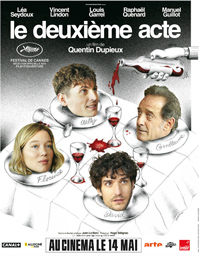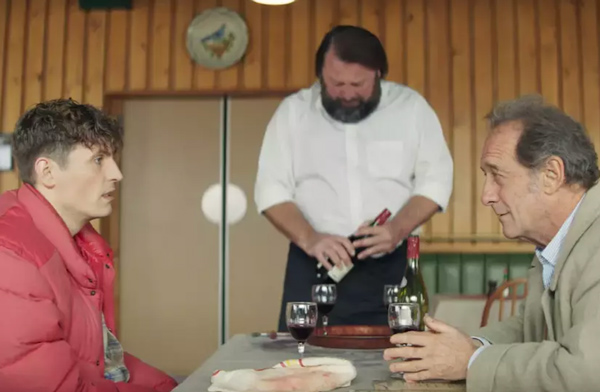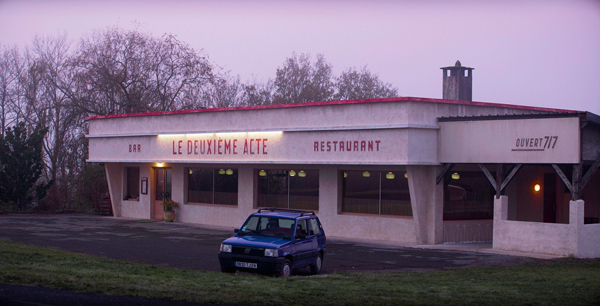The Art of Saying Nothing: Dupieux Deconstructs Cinema
 Had Luis Bunuel approached conveying the reality of cinema produced by artificial intelligence, there may have been some similarities with what Quentin Dupieux is doing in his latest feature, Le Deuxième Acte (The Second Act). Of course, ironically, it is a film which doesn’t technically feature anything resembling a second act, and much like Dupieux’s previous films, actively disrupts notions of coherence or linear expectation. Such is the generally the blessing and curse of the perennial Dupieux, who seems to operating at the same frantic pace of someone like Rainer Werner Fassbinder, only with less of a success rate considering his strict adherence to an absurdism which suggests his films are probably more entertaining for those who made them than an audience trying to grasp at his intentions. Much like a late conversation between two characters in this film arguing over the notion of ‘reality is fiction’ and vice versa, this is a film which suggests it’s about filmmaking before conveying absolutely everything is both a performative function…but also a version of reality. Ultimately, the thoughts it provokes are more inherently interesting than the film’s self-obsessed vein of self-awareness.
Had Luis Bunuel approached conveying the reality of cinema produced by artificial intelligence, there may have been some similarities with what Quentin Dupieux is doing in his latest feature, Le Deuxième Acte (The Second Act). Of course, ironically, it is a film which doesn’t technically feature anything resembling a second act, and much like Dupieux’s previous films, actively disrupts notions of coherence or linear expectation. Such is the generally the blessing and curse of the perennial Dupieux, who seems to operating at the same frantic pace of someone like Rainer Werner Fassbinder, only with less of a success rate considering his strict adherence to an absurdism which suggests his films are probably more entertaining for those who made them than an audience trying to grasp at his intentions. Much like a late conversation between two characters in this film arguing over the notion of ‘reality is fiction’ and vice versa, this is a film which suggests it’s about filmmaking before conveying absolutely everything is both a performative function…but also a version of reality. Ultimately, the thoughts it provokes are more inherently interesting than the film’s self-obsessed vein of self-awareness.

A film shoot is underway, albeit one where the director seems suspiciously absent. David (Louis Garrel) and Willy (Raphael Quenard) are actors playing two best friends on their way to meet Florence (Léa Seydoux) for dinner. She’s been obsessed with David for the past several months, and, like a character from a Bertrand Blier film, David is simply not attracted to her because she’s too beautiful. Thus, his character desires Willy sleep with her, and therefore derail her amour fou. However, the men digress into conversations about trans women which makes both of them seem questionable, for different reasons. Meanwhile, Florence’s character is scheduled to arrive at the dinner with her father, Guillaume (Vincent Lindon), who is ready to walk off set in dismay over the script until he receives a surprise call offering him a role in the new Paul Thomas Anderson film. Finally, all four parties unite at the setting of their next scene, a restaurant called “The Second Act.” But they all get on each other’s nerves, leading to a physical altercation between Willy and Guillaume.
Its quartet of lead performers are all enjoyable, digging into their own reputations and personas a bit. Dupieux utilizes long tracking shots for several extended conversations between these actors, the first playing with the notion of creatives in crisis while they break their scenes to navigate self-censorship and cancel culture or work through guilt and anxiety regarding their frivolous occupations. The film is at its most vibrant when the quartet and the respective characters they’re playing unite at the eponymous restaurant where a waiter (Manuel Guillot) portrayed by an extra appears to have such extreme anxiety he cannot pour them wine, thus indefinitely disrupting the shoot. What follows is a logically violent Dupieux flourish, which reveals everything we’ve thus seen is actually part of a production written and directed by artificial intelligence. The sequence features the film’s best comedic moments, including Willy’s revelation he took his stage name from the American television series “Different Strokes” due to his reverence for Gary Coleman’s ‘black dwarf,’ never realizing Willis was actually the character played by Todd Bridges.

The film’s final two sequences, where the actors switch pairings and are behaving as their ‘real’ selves once again attempts to defy our assumptions about each of them. Suggesting the two ‘problematic’ characters, Quenard and Lindon, are actually a gay couple, is initially interesting, if not played quite believably (though Lindon dons a fake mustache to define himself in this sequence, an oblique reference to his 2005 film The Moustache). Seydoux plays on her reputation for crying profusely in auteur cinema, and a moment where she threatens to destroy Quenard in the press for trying to kiss her ends up feeling more prescient than Dupieux perhaps intended. But one gets the sense Dupieux had an opportunity to be more scathing, more intelligently contemplative about the smoke and mirrors which defines life as well as cinema. It’s one of several offerings in his filmography where the overall joke feels beaten to death. However, an impressively persevering cast and some impressive flourishes (at least more than usual) in Dupieux’s cinematography are worthy of note, particularly a final tracking shot of train tracks which recalls, of all things, Carlos Reygadas’ 2002 masterpiece, Japon.
Reviewed on May 14th, 15th at the 2024 Cannes Film Festival Out of Competition – Open Film. 76 Mins.
★★½/☆☆☆☆☆


